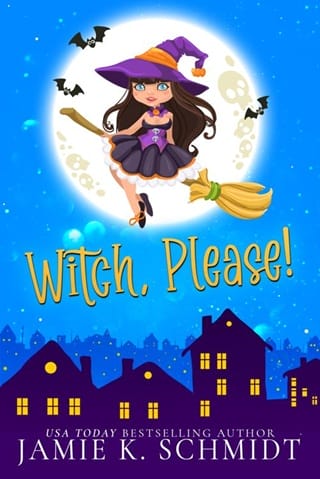Chapter Two
Chapter Two
I’ve never been inside the forest at night. As soon as the sun goes down, we don’t venture farther than the thin perimeter that surrounds Keszi, where the trees bloom green in summer and shed their leaves in autumn, and we certainly don’t wander into the true woods, the thick tangle of forest behind it, seething and dark. Here the trees do not abide by the laws of the gods, to change with the seasons or to grow straight up, slender branches straining toward the sky. We pass trees in their full spring display, lush with verdant leaves and needle-thin white flowers, and then trees that are rotting and dead, blackened all the way down to the roots, as if they’ve been struck by vengeful lightning. We pass trees that have grown twisted around each other, two wooden lovers locked in eternal embrace, and then others still that bend backward toward the ground, as if their branches are aching toward the Under-World, instead.
I scarcely even think to fear the forest. I am too busy fearing the Woodsmen.
Although I don’t care to, I learn their names quickly enough. The young blond Woodsman who bound me is Imre, the rugged older one with a bow and quiver strapped to his side is Ferkó, and the surly Woodsman behind me is Peti. Whenever I dare to glance over my shoulder, I see Peti staring daggers into my back, almost certainly wishing he could put an ax through it. Eventually I stop looking behind me at all.
“When are you going to dazzle us with your magic, wolf-girl?” Imre asks as we pass by a copse of trees that bear fleshy, foul-smelling fruit the shade of cloudy river water.
I stiffen. Wolf-girl is one of their many names for us, but I find it more unbearable than any of the others. After all, I have no magic, and I’ve done nothing to earn the cloak that hangs spuriously on my shoulders.
“I can’t choose when the visions come,” I reply, and hope he doesn’t notice the way my face burns with the lie.
“A lot of use that is. Don’t they teach you a way to call your visions?”
His casual tone frightens me more than Peti’s livid silence. No conversation should be easy between predator and prey. “It’s not something that can be taught.”
“Ah.” Imre’s blue eyes gleam. “Just as we in the Holy Order of Woodsmen are not taught to hate all pagans with the greatest passion. The loathing is in our blood.”
My grip tightens around the reins, stomach roiling. “You must hate me, then.”
“Certainly,” Imre replies. “But unlike the dullard on your other side, or the simpleton behind, I’d rather pass the time by talking than staring into the darkness and waiting to die.”
“Perhaps the rest of us would rather die in silence,” Ferkó mutters.
“The Woodsmen do not fear death,” Peti speaks up gravely. “The Prinkepatrios welcomes us to eternal glory.”
“Only if you die with honor. And I intend to run away screaming the moment I see so much as a pair of eyes in the dark.”
“That’s not funny,” Peti growls, bringing his horse to a canter so he can give Imre a steely glare.
“Don’t worry, Peti. I was only teasing. I promise to protect you when the monsters come.”
Peti’s ear tips turn red. “You’re going to tease your way to an early grave.”
“Better to die young with a smile on my face than live a long life without laughter.”
“If you really believed that, you wouldn’t have become a Woodsman,” Peti says.
“Quiet.” It’s the captain’s voice. I haven’t heard him speak since we entered the woods, and he’s quieter now than I expected, almost like he’s embarrassed of his authority. Of course I haven’t dared to ask his name. On the rare occasions that his soldiers do speak to him, they refer to him only as kapitány. He hasn’t fixed me with murderous stares like Peti, or tried to goad me into terrifying conversation like Imre, but I fear him worse than both of them put together. Despite the softness of his voice, his missing eye speaks of one thing—a fierce devotion to his god, which means a greater hatred for pagans and wolf-girls than either of these shorn men.
The captain halts on the path. We skid to a stop behind him, and I peer down at the ground, half expecting to see a mangle of entrails or the corpse of something freshly slaughtered. But it’s only a circle etched in the dirt. I might have believed it was an accident, maybe an animal dragging its tail on the ground behind it, but then I look again. Farther down the path are cloven prints, and then beyond that, the unmistakable stumbling tracks of a barefooted man. Looking at it makes me feel dizzy and sick.
The footprints lead us away from the circle and toward a tight grove of oak trees. Their leaves are brown, dead, curling like Virág’s ancient reed roof. The trunks have the same circle etched into them, and their roots are fetid and black. The smell of spoiled meat blows past us.
“Shall we investigate, kapitány?” Ferkó asks, drawing his ax.
The captain is silent as he glances around the grove. He turns his head fully to either side, so he can examine it all despite his missing eye. For a moment, his gaze lands on me, and my stomach turns into a cold, dark pit.
“No,” he says. “Let’s move on.”
By the time we stop for the night, I have planned my escape seven times.
Leap off my horse and disappear into the trees before the Woodsmen can think to stop me. Cut the rope around my wrists on a sharp rock and flee back to Keszi. Pray to Isten that the Woodsmen die in the forest somewhere and never come to find me. Pray the king doesn’t decide to punish all of Keszi for my ruse and burn our village to the ground like his great-grandfather, Saint István, did to the rest of the pagan tribes.
I would rather stare down the awful rotted heart of the forest than face the Woodsmen and their axes. I know it makes me a coward, and perhaps also a fool. But my mother’s fate is a flitting bird I refuse to follow. I can’t swallow the thought of the Woodsmen killing the little part of her that’s left in me, the facsimile of our shared blood.
We are finally allowed to camp in a small clearing, gridded by a copse of birch trees, their pale skin half-shed. Spirals of birch paper are littered in the dead grass, and there is still the faint but unmistakable scent of meat left out too long in the sun. Peti and Ferkó scout the area for safety, axes drawn. I can’t help but eye the bow and quiver on Ferkó’s back, muscles twitching with deep-rooted memory. I will never shoot an arrow again. Imre collects logs and dry leaves for a fire, and sets them on the ground in front of the captain. I stand pressed to my mare’s flank, wrists still painfully bound.
The captain removes his gloves and clasps his bare hands together. For a moment I think he might start to pray, and want to turn away in revulsion. But he only utters a single word: “Megvilágit.”
He says it almost as if it were a question, or a polite request, the same deferential tenor to his voice that shocked me before. And then a fire roars to life in front of him.
I cannot help the sound of alarm that slips out from between my lips, nor the accusation that follows it. “I thought Woodsmen decried all acts of magic.”
“It’s not magic,” Imre says, stoking the fire with a birch-striped tree branch. “It’s faith. The only powers we have are what Godfather Life gives us. We ask, and He answers.”
“Does he always answer?”
A shadow darkens the captain’s face.
“He rewards loyalty,” says Imre. “The more devotion you prove, the greater powers He grants you. I don’t think He has ever refused a request from the Érsek.”
I meet his gaze, shivering, wanting to ask who the Érsek is but not sure I can risk another question.
“The Érsek is the highest religious authority in Régország,” Imre says, preempting me, “and the king’s closest confidant. Király és szentség, royalty and divinity. Think of them like twin pillars that hold up the kingdom.”
I would rather not think of them at all. There’s no place for wolf-girls in such a kingdom. As the captain’s fire burns, I remember all the times I tried to light one of my own. How many hours I spent hunched over Virág’s hearth, desperate to will a weak little flame onto my fingertips. Virág would stand above me, arms folded crossly, repeating the same adages that had never done me any good before.
“In order to perform the skills, you must know the origin of them,” she’d said. “Do you remember the story of how Vilmötten first made fire? Late one night, Isten tossed a star out of the sky. Vilmötten watched it fall down to the Middle-World and sink into the sea. He dove into the water after it, hoping to rescue the star and win Isten’s favor. When he reached the bottom of the ocean, he saw that the star was bright with blue flame, even underwater. He could not hold it and swim at the same time, so he put the star in his mouth and swallowed it. And when Vilmötten returned to the surface, the star was still breathing inside him, and he could summon fire without a flint.”
“I know the story,” I had snapped. “I just can’t do it.”
Virág would sigh and shake her head, or if she were in a particularly bitter mood, order me to scrub her tunic clean as punishment for my failure and my foul mouth. But after a while she gave up watching me crouch futilely over her hearth, and I gave up trying to do magic at all. Fire-making was meant to be the simplest of the three skills. If I couldn’t manage that, how could I ever hope to forge metal or heal wounds?
I had always thought that somehow she was playing me for a fool, like there was some secret she and the rest of the women knew and were all gleefully keeping from me. I knew the stories as well as any of them, but it still wasn’t enough. It was better than thinking that I’d been cursed, or that there was something strange and ruinous in my blood.
I want to reach for the gold coin in my pocket now, but my hands are tied. On the other side of the fire, the captain is laying out his mat. There’s a small knife strapped to his boot, right below the crook of his knee, steel handle glinting in the firelight.
“The area looks clear, kapitány,” Peti says. “I’ll take first watch.”
I wonder if he means watching me, or watching for something in the woods that we could never hope to see before it kills us. EzerSzemmeans thousand-eyed. If you stare long enough into the darkness of the forest, eventually something will stare right back.
Exhaustion has begun to eat away at my fear, eroding it like the riverbank after a rainstorm. There’s no way to tell how long we’ve been in the woods, but my body aches as if I’ve been riding for a day or more. Imre and Ferkó pad down beside the fire, resting their heads on their packs.
The captain looks at me expectantly, his single eye unblinking. When I don’t move, his fingers go to his ax, and he draws it with an odd, mortified hesitation, like he can’t quite gauge the weight of it in his hands. Stupid, I think of my own evaluation. He and his blade have both been honed for killing pagan girls like me.
He closes the space between us in three long strides. I imagine the trajectory of his ax—the arc it would have to follow to meet my throat. But perhaps I can better estimate the danger by looking in his eye. It’s angled downward, lashes casting a feathery shadow across his cheekbone.
Without speaking, the captain thrusts the hilt of his ax against my back, right between the blades of my shoulders. Through my wolf cloak and my tunic beneath, I can feel the press of the wood, its muffled meanness. The captain swallows, throat bobbing.
My legs tremble as I lower myself to the ground. I wonder if he recognizes the fettered hatred in the grit of my teeth, or if he only sees my white-faced fear. I wonder if it brings him pleasure, to see me on my knees. I don’t breathe again until the captain returns to his own mat, even if his one black eye is still watching me.
I’m supposed to sleep. But my gaze keeps drawing back to the blade on his boot.
Night falls differently in Ezer Szem. The wind goes silent when the sun goes down. The shadows mottle themselves into shapes that look like claws and teeth. After a few hours, the fire is smoldering, more ash than flame, and I can’t see farther than a few feet in front of me. I can only hear the soft, sleeping exhales of the Woodsmen and the crackle of dead leaves as something moves behind the tree line.
I can’t steal the captain’s knife without waking him. But maybe I can slip away while they’re asleep and vanish into the darkness of the woods. I’ll take my chances with monsters. The Woodsmen are worse.
Jaw clenched, I push myself up onto my elbows, then my knees. I shimmy onto the balls of my feet and stand, wincing as my sore muscles arch and bend. I take two preliminary paces backward, pausing to listen for the sound of someone stirring. Nothing. I turn to face the cold, solid blackness.
I haven’t gone more than fifty paces away from camp when something catches the collar of my cloak. A scream boils in my belly, but I swallow it down. I try to adjust my eyes, to see what awful creature has gotten ahold of me. But all I can hear is heavy human breathing. A hot, mortal hand grazes the skin of my throat.
Out of the darkness, a lantern blazes gauzy and yellow, illuminating a crescent of its face: a stubbled chin and nose red with broken blood vessels. It’s no monster. It’s Peti.
I let out a breath that sounds like shaky laughter. My escape plan is foiled before it’s even begun, and I’m a daft, doomed fool. “What are you going to do with me?”
“What our captain doesn’t have the piety to do,” he says, and draws his ax.
I realize at once that I’ve made a terrible mistake. There’s nothing human about Peti’s face at all. His lips pull back into a snarl, showing all the icicle points of his teeth, and even the whites of his eyes are burning, stitched through with red.
The lantern falls to the ground, the light half-obscured by dead leaves. In the muffled glow I see the flash of Peti’s ax, and I roll out of the way, almost too late. With a furious howl, Peti leaps on top of me, pinning me to the grass. I struggle against his weight, but he’s too strong and my limbs are flailing uselessly as he grits his teeth and pulls a dagger from the shaft of his boot.
Sweat clings to his face in a sickly sheen, cast a livid green by the lantern light. Peti is breathing hard, his heart pounding wildly against our adjacent chests, like someone is hammering on the door of my rib cage. Animal instinct edges out the fear. Driven by a mad, frantic desire to live, I lift my head and sink my teeth into his ear.
He screams, and I jerk back with as much force as I can. Blood spurts through the air and lands in thick strands on my wolf cloak, on Katalin’s beautiful white wolf cloak. Peti rolls off me, sobbing and clutching the side of his head.
I spit muscle and sinew out of my mouth and wipe his blood from my face.
“You wanted a wild wolf-girl,” I say in a strangled voice that doesn’t sound at all like my own. “You got one.”
“Not me,” Peti groans. “The king. He hasn’t—he won’t do what needs to be done. He’ll let his country burn before he rids the country of the pagan scourge.”
His words chill me. I tell myself they’re the ramblings of a madman with one fewer ear than most. But my moment of bewilderment gives him an opportunity. He’s on top of me once again, blade flush against my throat.
“You don’t deserve the dignity of a swift death,” he growls. The knife digs into my skin. Not deep enough to kill, but enough to draw a collar of beaded red around my neck. Enough to make me stammer out a sob and squeeze my eyes shut. At least I can choose to die without looking at his face, terrible and stupid with bloodlust.
Then his weight vanishes from my chest. I open my eyes to see the captain lift Peti’s body off me and throw him to the ground, limp and boneless. For a moment, my heart staggers with relief, almost gratitude, before loathing takes hold of me again. I hate the cold blackness of the captain’s eye and the sharp cut of his jaw even as he pulls Peti off me.
Peti cowers under the gleam of the captain’s ax, weeping.
“Your orders were to bring the wolf-girl to the capital, not to mutilate and murder her,” the captain says, raising his voice over the sound of Peti’s wailing.
“Király és szentség!” he bawls. “The king only commands half my loyalty. I must do what is right by the one true god, and by Nándor—”
“It was the king who put the ax in your hand,” the captain cuts in, but I see something that looks like panic dart across his face. “You betrayed the Crown.”
“What about her?” Peti raises a trembling finger and points at me. “She dishonors the very name of Régország with her filthy pagan magic.”
The captain’s gaze flickers briefly over me, an unreadable expression in his eye. “Her fate is for the king to decide.”
Imre and Ferkó both come running, hair mussed and axes in their hands.
“What’s going on?” Imre demands.
“She bit off my ear,” Peti whimpers.
“You tried to kill me,” I remind him, my voice shaking.
“Traitor.” Ferkó spits on the ground in front of him. “You know the king’s orders.”
“And should I follow the orders of a king who defies the will of God?” The wild, wheeling look of desperation in Peti’s eyes fades. For a moment there’s something more lucid about him, blood trickling from the ruin of his ear. “When there is another who ought to wear the crown, and will honor the Prinkepatrios in his reign? Nándor—”
“Don’t.” The word huffs out of the captain’s mouth in a white cloud. “Don’t say his name again.”
Imre’s brows pull together, but his grip on the ax doesn’t slacken. “You know the punishment for treachery, Peti.”
Weeping again, Peti doesn’t reply.
The captain glances between Ferkó and Imre. “Hold him down.”
Together the Woodsmen lurch toward him, and Peti howls. They wrestle him onto his back, pinning his arms flat, limbs spread-eagled. I watch and watch, horror building in my chest. The captain stands at Peti’s feet, hairs rising on his black suba. In the lantern light, Peti’s face is slick with tears.
Imre kneels on Peti’s hand, keeping his arm pressed to the ground. He unsheathes the knife from his boot and thrusts the hilt of it into Peti’s mouth.
“Bite down,” Imre says. I realize with a start that his face is damp too.
A word of protest rises in my throat, but I remember the mad, monstrous look on Peti’s face as he pressed his blade to my skin, and the word dies before I can speak it.
The captain brings down his ax in a neat arc, right below Peti’s left shoulder. The swift scything of the ax ruffles the hairs of his suba, and when the blade buries itself in the earth, they lie flat again.
For a long moment, the forest is silent. Ferkó and Imre get to their feet. The captain lifts his ax, the sickled edge of the blade dripping something viscous and black. With bleary, languid movements, as if he’s just been woken from slumber, Peti shifts on the grass, raising his head. When his torso rises, his arm doesn’t come with it.
I see the white knob of bone jutting from his shoulder, and the jewel-hued mangle of flesh, red as overripe berries. I see the ragged flaps of skin draped over the sudden termination of his arm, fluttering limply in the scant breeze.
The knife falls out of Peti’s mouth. He screams, louder than anything I have heard before. My stomach clenches like a fist and I double over, palms pressed against the damp earth, retching.
 Fullepub
Fullepub 



